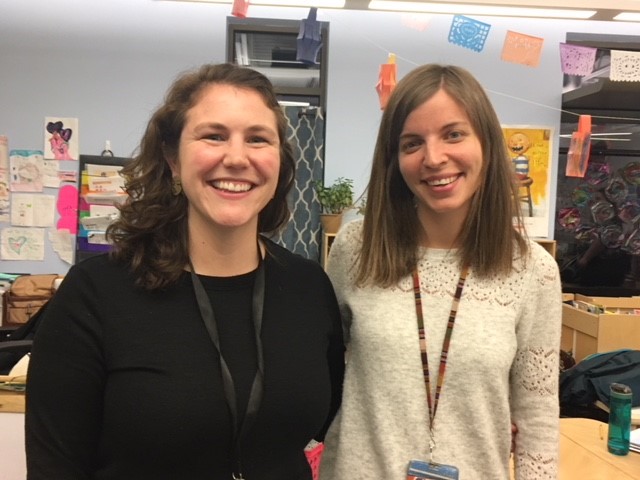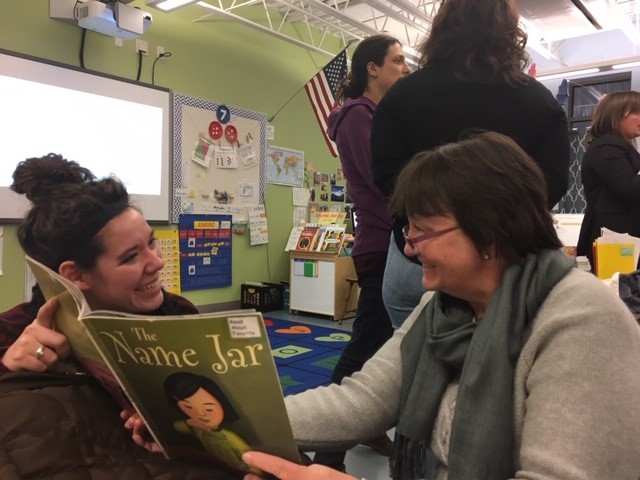Curriculum Workshops by Teachers, for Teachers
One recent afternoon at East Somerville Community School, a Professional Development course titled “Curriculum Development for Sanctuary Schools, Grades PreK-2,” was led by colleagues Julie Allen and Helen Schroeder. Julie Allen teaches 1st grade in the Unidos Program, and Helen Schroeder teaches Kindergarten in an Integrated Structured English Immersion (SEI) classroom. The 20 teachers who attended represented every elementary school across the district. At the exact same time, two other Curriculum Development for Sanctuary Schools courses were run for teachers in grades 3-6 and grades 7-12, led by teachers also in those grade cohorts. It was the first time this Curriculum Development for Sanctuary Schools model was offered as part of Somerville Public School’s Professional Development Modules. These modules allow SPS teachers to continue to deepen their teaching practice. For all, this was the first of a three-part workshop to help teachers develop and share lesson plans that address immigration and social justice. One of the most exciting parts of the workshop is its three-step approach. After sharing successful lesson examples, new reading materials, and best practices around culturally responsive curriculum in the first week, the following week the teachers were tasked with developing and implementing changes immediately into their classroom practice. Then, in the third week, the teachers reconvened to share their outcomes.
“Welcomed, Respected, Cherished, and Protected”
Teachers attended the workshop for different reasons. Some wanted to make sure they were not inadvertently reinforcing negative stereotypes prevalent in popular culture; some wanted tools for adding culturally responsive lessons to their current read alouds; some wanted to refresh their classroom libraries so that their collections more accurately represented their students’ experiences. But the larger goal was the same: to do their very best as teachers to make sure that each student feels, “welcomed, respected, cherished, and protected.”
Focus on Individual Student Experiences as Lessons for All / Windows and Mirrors
In the current divisive climate, it may seem challenging to tackle social justice and immigration issues, especially with our district’s youngest learners. But by focusing on individual stories and experiences, according to Ms. Allen and Ms. Schroeder, it makes the topic less daunting and more relevant.
Since data show that almost half of all Somerville Public School students speak a first language other than English, and wanting to explore the concept of immigration and migration as a human experience, some teachers highlighted their success with lesson plans tied to books such as The Name Jar, by Yangsook Choi. This is a story about a girl from Korea, Unhei, who is new to a school in America and who tells her classmates that she’ll pick a new name for them to call her because hers is hard for them to pronounce. A new friend learns the special meaning of her name in Korean and rather than having Unhei pick a new name, she teaches her classmates how to pronounce it.
Another successful lesson plan idea focused on the book I’m New Here by Anne Sibley O’Brien, which presents the story and feelings of three young immigrants adjusting to a new school and country. The companion book, Someone New, explores the story and feelings of the students who welcome the young immigrants to their classroom. The stories explore the notion of windows and mirrors as ways for students after a read aloud to discuss what they learned from the books. And they work as a jumping off point for other comments and questions the students will bring up on their own.
Benefits for Students / Benefits for Teachers
The For Teacher, By Teacher professional development module allows teachers to share best teaching practices and explore ways to better engage students in their classrooms. One of the most effective ways to do this is to make sure their students see themselves represented in their classrooms’ lessons and stories, and as connected and vital members of the community around them. This helps lay the foundation for students to become lifelong learners, and to have curiosity, empathy, and tolerance for others.
Why is this culturally responsive curriculum development important in Somerville and in its role as a Sanctuary City? Ms. Allen and Ms. Schroeder answer this question with one of their own that they posed to their teaching colleagues in their first session, “Well, if we don’t, there’s a hidden curriculum layer. What is the message we send to students about their ‘self-hoods’ if experiences closest to their own aren’t discussed in school?”
A. Luthin, Writing Communications Specialist


